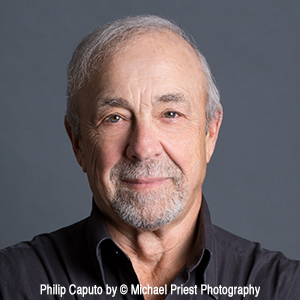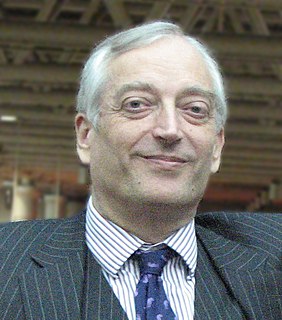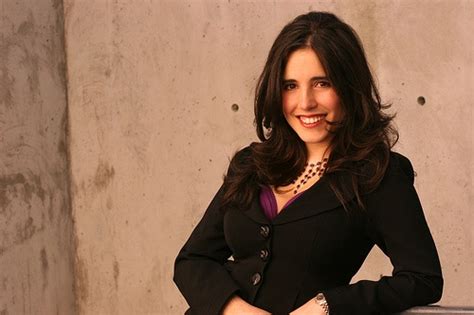Top 599 Intellectually Quotes & Sayings - Page 10
Explore popular Intellectually quotes.
Last updated on December 23, 2024.
In terms intellectually, [what] shaped my life was the whole Munich thing [the Munich Agreement] that I knew about all my life, in terms of how large powers make decisions that affect small countries, and the unintended consequences of that. The other part is I knew about the Holocaust. l just didn't know that it applied to my family. But that did affect the way I thought about what I was seeing as ethnic cleansing in the Balkans; there's no question about that.
I'm naive. I will admit that I'm naive. There's a part of me, honestly, to the depths of my soul, that doesn't understand why people hate this country. Intellectually, I understand it. I understand the politics of grievance, and I understand the way people have been taught, but compared to every other place human beings have lived before this country and since it was founded, it makes no common sense to hate this place, and yet people do.
It doesn't matter if it's jazz or not. It's about how we listen, how we interact, how we guide our attention when we're listening, and how we can refine what we're doing musically. Also how we can create our own music, and what opportunities that can bring us, as creative musicians. And then insisting that musicians put themselves through an intellectually rigorous process, which involves a lot of reading and writing, while insisting that music scholars think about ethics.
Science itself is badly in need of integration and unification. The tendency is more and more the other way ... Only the graduate student, poor beast of burden that he is, can be expected to know a little of each. As the number of physicists increases, each specialty becomes more self-sustaining and self-contained. Such Balkanization carries physics, and indeed, every science further away, from natural philosophy, which, intellectually, is the meaning and goal of science.
The truth is that family values, as used by the American Family Association, Dan Quayle, and the southern Baptists, has nothing to do with either family or values, nor does it really have anything to do with homosexuals, abortionists, or pornographers. Those groups actually only serve as windmills to tilt at. The true agenda is power - power over the intellectually weak, emotionally immature, and ethically deficient Americans who are incapable of critical thinking and independent decision-making, and who are easily manipulated by the basest of human emotions - fear and the desire for revenge.
A famous bon mot asserts that opinions are like arse-holes, in that everyone has one. There is great wisdom in this... but I would add that opinions differ significantly from arse-holes, in that yours should be constantly and thoroughly examined.We must think critically, and not just about the ideas of others. Be hard on your beliefs. Take them out onto the verandah and beat them with a cricket bat.... Be intellectually rigorous. Identify your biases, your prejudices, your privilege.
Imagine a person who comes in here tonight and argues 'no air exists' but continues to breathe air while he argues. Now intellectually, atheists continue to breathe - they continue to use reason and draw scientific conclusions [which assumes an orderly universe], to make moral judgments [which assumes absolute values] - but the atheistic view of things would in theory make such 'breathing' impossible. They are breathing God's air all the time they are arguing against him.
One of the thing about being President - that can't be taught, you have to experience, is - there is the sheer weight of decision making. And when I make a decision to send 17,000 young Americans to Afghanistan - you can understand that intellectually. But understanding what that means for those families, for those young people - when you end up sitting at your desk, signing - a condolence letter to one of the family members of a fallen hero - you're reminded each and every day, at every moment, that - the decisions you make count.
Society is a republic. When an individual endeavors to lift himself above his fellows, he is dragged down by the mass, either by means of ridicule or of calumny. No one shall be more virtuous or more intellectually gifted than others. Whoever, by the irresistable force of genius, rises above the common herd is certain to be ostracized by society, which will pursue him with such merciless derision and detraction that at last he will be compelled to retreat into the solitude of his thoughts.
The new "ambiguity" means, in a way adjudged favorable to literary, poetic, intellectually and psychologically well-devised and praiseworthily executed linguistic performance, uncertainty of meaning, or difficulty for the interpreter in identifying just what the meaning in question is: it means the old meanings of ambiguity with a difference. It means uncertainty of meaning (of a word or combination of words) purposefully incorporated in a literary composition for the attainment of the utmost possible variety of meaning-play compressible within the verbal limits of the composition.
Philosophy is a necessary activity because we, all of us, take a great number of things for granted, and many of these assumptions are of a philosophical character; we act on them in private life, in politics, in our work, and in every other sphere of our lives -- but while some of these assumptions are no doubt true, it is likely, that more are false and some are harmful. So the critical examination of our presuppositions -- which is a philosophical activity -- is morally as well as intellectually important.
As soon as a thought or word becomes a tool, one can dispense with actually 'thinking' it, that is, with going through the logical acts involved in verbal formulation of it. As has been pointed out, often and correctly, the advantage of mathematics - the model of all neo-positivistic thinking - lies in just this 'intellectual economy.' Complicated logical operations are carried out without actual performance of the intellectual acts upon which the mathematical and logical symbols are based. ... Reason ... becomes a fetish, a magic entity that is accepted rather than intellectually experienced.
Every sensation shares the same characteristic: it arises and passes away, arises and passes away. It is this arising and passing that we have to experience through practice, not just accept as truth because Buddha said so, not just accept because intellectually it seems logical enough to us. We must experience sensation’s nature, understand its flux, and learn not to react to it.
One of the most important analytic tools when assessing an investment is an intellectually advantaged disparate view. This includes knowing more and perceiving the situation better than others do. It is also critical to have a keen understanding of what the market expectations for any investment truly are. Thus, the process by which a disparate perception, when correct, becomes consensus should lead to meaningful profit. Understanding market expectation is at least as important as, and often different from fundamental knowledge.
I didn't abandon my studies. Because I was, through no - clarify this. Through no particular genius of my own, I was the first person from Libertyville Public High School to attend Harvard, not because I was smarter than anyone or better than anyone, but no one had ever applied before. It was like University of Illinois, a fine institution, was the sort of the upper echelon of places where kids went from that school. And so I felt sort of a duty to myself and my peers to continue with those studies, and to continue to, intellectually arm myself for my coming struggles.
When we affect to condemn savages, we should remember that by doing so we asperse our own progenitors; for they were savages also.Who can swear that among the naked British barbarians sent to Rome to be stared at more than 1500 years ago, the ancestor of Bacon might not have been found?--Why, among the very Thugs of India, or the bloody Dyaks of Borneo, exists the germ of all that is intellectually elevated and grand. We are all of us--Anglo-Saxons, Dyaks and Indians--sprung from one head and made in one image.
In Aristotelian terms, the good leader must have ethos, pathos and logos. The ethos is his moral character, the source of his ability to persuade. The pathos is his ability to touch feelings to move people emotionally. The logos is his ability to give solid reasons for an action, to move people intellectually.
Intellectually I touched God many times as truth and emotionally I touched God as love. I touched God as goodness. I touched God as kindness. It came to me that God is a creative force, a motivating power, an over-all intelligence, an ever-present, all pervading spirit - which binds everything in the universe together and gives life to everything. That brought God close. I could not be where God is not. You are within God. God is within you.
[T]he guilty as well as the innocent are entitled to due process of law. They are entitled to a fair trial. They are entitled to counsel. They are entitled to fair treatment from the police. The law enforcement officer has the same duty as the citizen-indeed, he has a higher duty-to abide by the letter and spirit of our Constitution and laws. You yourselves must be careful to obey the letter of the law. You yourselves must be intellectually honest in the enforcement of the law.
Setting a field for synchronicity is a matter of putting yourself in a particular state of mind. It is easy to think about synchronicity intellectually, but unless you enter the state of mind where your prayer-field will help, all you will do is glimpse the coincidences every once in a while. In some situations that is enough and you will be led forward for a time, but eventually you will lose your direction. The only way to establish a constant flow of synchronicity is to stay in a state where your prayer field keeps this flow moving toward you--a state of conscious alertness.
A form of intellectual productiveness, therein lies its peculiar charm. Intellectual productiveness is one of the greatest joys - if not the greatest one - of human existence. It is not everyone who can write a play, or build a bridge, or even make a good joke. But in chess everyone can, everyone must be intellectually productive, and so can share in this select delight. I have always a slight feeling of pity for the man who has no knowledge of chess, just as I would pity the man who has remained ignorant of love. Chess, like love, like music, has the power to make men happy.
No sane person wants hell to exist. No sane person wants evil to exist. But hell is just evil eternalized. If there is evil and if there is eternity, there can be hell. If it is intellectually dishonest to disbelieve in evil just because it is shocking and uncomfortable, it is the same with hell. Reality has hard corners, surprises, and terrible dangers in it. We desperately need a true road map, not nice feelings, if we are to get home. It is true, as people often say, that "hell just feels unreal, impossible." Yes. So does Auschwitz. So does Calvary.
Actually, on a slightly more serious but kind of parallel level, I remember being on Loveline before both hosts ascended into loftier places in the culture. But I remember being shocked by Dr. Drew. He went into this extended monologue about how anyone with a baby voice is probably the victim of child abuse or has some daddy issue. As an intellectually curious person, all I could think is that there isn't any clinical evidence about that. But to be the guy wearing the doctor's hat on the radio and teaching everybody about this? It just seemed like a parody of good advice.
Religions, of course, have their own demanding intellectual traditions, as Jesuits and Talmudic scholars might attest.... But, in its less rigorous, popular forms, religion is about as intellectually challenging as the average self-help book. (Like personal development literature, mass market books about spirituality and religion celebrate emotionalism and denigrate reason. They elevate the "truths" of myths and parables over empiricism.) In its more authoritarian forms, religion punishes questioning and rewards gullibility. Faith is not a function of stupidity but a frequent cause of it.
From this day forward, I no longer shall tinker with the machinery of death. For more than 20 years I have endeavored - indeed, I have struggled - along with a majority of this Court, to develop procedural and substantive rules that would lend more than the mere appearance of fairness to the death penalty endeavor. Rather than continue to coddle the Court's delusion that the desired level of fairness has been achieved and the need for regulation eviscerated, I feel morally and intellectually obligated to concede that the death penalty experiment has failed.
On the river path in Boston beauty was most expressed as youth and intelligence. That made sense; sixty degree-giving institutions, some three hundred thousand students; that meant at least one hundred fifty thousand more nubile young women than demographics would ordinarily suggest. Maybe that was why young men stayed in Boston when their college years were over, maybe that explained why they were so intellectually hyperactive, so frustrated, so alcoholic, such terrible drivers.
As you learn to consciously observe the transformation process, you will watch yourself repeating a lot of old patterns long after you seemingly know better. Spiritually and intellectually, you realize there is another way, but emotionally you are still clinging to the old habits. This is a difficult time. Try to be patient and compassionate with yourself. When you recognize the futility of an old pattern so clearly, it's about to change! A short time later, you will suddenly begin to respond differently, in a more positive way.
Since man does not create physical matter, those who handle material objects in the production process are not producers in that sense. Economic benefits result from the transformation of matter in form, location, or availability (intellectually or temporally). It is these transformations that create economic benefits valued by consumers, and whoever arranges such transformations contributes to the value of things, whether his hands actually come into contact with physical objects or not.
It is important to understand, not intellectually but actually in your daily life, how you have built images about your wife, your husband, your neighbor, your child, your country, your leaders, your politicians, your gods-you have nothing but images. The images create the space between you and what you observe and in that space there is conflict, so what we are going to find out now together is whether it is possible to be free of the space we create, not only outside ourselves but in ourselves, the space which divides people in all their relationships.
D.H. Lawrence, I think, defined the difference between writing an article and writing a novel very well. He said, in writing a novel, the writer must be able to identify emotionally and intellectually with two or three or four contradicting perspectives and give each of them very a convincing voice. It's like playing tennis with yourself and you have to be on both sides of the yard. You have to be on both sides, or all sides if there are more than two sides.
Success is not in obtaining the thing. Because there's always another thing. And then you look back on it, and for me, through my evolution, yes I have success by most measures - but for me, when it comes to the greatest joy of reward, there's an emotional element and there's an intellectual element. Emotionally, my greatest joy was the personal relationships I've had. That was the greatest joy. Intellectually, my satisfaction was that I do feel I've evolved well and I'm doing my best to contribute toward evolution.
No man who enters upon the office to which I have succeeded can fail to recognize how every president of the United States has placed special reliance upon his faith in God. Every president has taken comfort and courage when toldthat the Lord 'will be with thee. He will not fail thee nor forsake thee. Fear not-neither be thou dismayed.' Each of our presidents in his own way has placed a special trust in God. Those who were strongest intellectually were also strongest spiritually.
The unraveling that I experienced much earlier in the Vietnam war than many people think, was due to the immediate foxhole experiences. But once I got back home and began to follow the war on TV and in the press I began to see this enormous con game - I can't think of any other word for it - that government and the military was foisting on the American people, especially on the young men of my generation, and even worse, the young men of my generation who weren't particularly economically or intellectually privileged.
People always think that loyalty is laudable. People are always saying that we must remain faithful to tradition, to family, to our class, to our ideas. Of course not! That would be equivalent to zero brain activity. If you really want to think, to seek truth, to advance intellectually, you must turn your back on clichés, on preconceived ideas - even those belonging to your spiritual family. For an intellectual, his true duty is not to fidelity, but to infidelity.
There was a transition going on - Baghdad being the intellectual capital of the world where major advances were made in agriculture and mathematics and engineering and medicine and astronomy, and then that all sort of collapsed. And I was trying to understand how such a intellectually fertile environment can lose its compass bearing. Because I think about the creative centers today - countries, or even regions. Will Silicon Valley always be as innovative? Will the United States be innovative, or will we become complacent?
People try to persuade us that the objections against Christianity spring from doubt. That is a complete misunderstanding. The objections against Christianity spring from insubordination, the dislike of obedience, rebellion against all authority. As a result, people have hitherto been beating the air in their struggle against objections, because they have fought intellectually with doubt instead of fighting morally with rebellion.
One of our most important tasks will be to save future generations from a similar political fate and to maintain for ever watchful in them a knowledge of the menace of Jewry. For this reason alone it is vital that the Passion play be continued at Oberammergau; for never has the menace of Jewry been so convincingly portrayed as in this presentation of what happened in the times of the Romans. There one sees in Pontius Pilate a Roman racially and intellectually so superior, that he stands like a firm, clean rock in the middle of the whole muck and mire of Jewry.
There are many cases in which gifted children have done great things without special school programs. There are also gifted kids who have been to special schools and achieved nothing that has benefited the world as a whole. Without solid evidence, I have no confidence that funding school programs for the intellectually gifted would do more good than the most cost-effective programs to help people in extreme poverty.
Focusing-Oriented Art Therapy is a major contribution to art therapy literature and practice. Laury Rappaport introduces a contemplative method and philosophy grounded in the body's felt-sense of experience and its innate and largely unrecognized wisdom. This intellectually provocative, yet thoroughly practical text, establishes Rappaport as an emergent leader in the art therapy world and author of a book that every student and art therapist must read in order to appreciate the depth and breadth of our discipline.
Nearly everyone who is unemployed votes "Democrat." Nearly every immigrant, at least in the first generation, votes "Democrat." Nearly every non-white American votes "Democrat." The GOP know that so intellectually and financially bankrupt an administration should never have been re-elected - indeed, given the scale of electoral fraud practiced by the "Democrats," he may not actually have been re-elected (always supposing that he had the constitutional right to hold the office of president in the first place).
I've been in New York for 14 years. I would never leave for good. The city is so much more alive than so many other places, and I think it is fodder for performers. You see so much; research is thrown at you everywhere you go. There was a rat on the subway train recently - you saw the video online - that's fantastic! That's something that is so specific to this city, the way you are pushed up against humanity, and the animal kingdom, whether you want to be or not. It's a stimulating city - physically, intellectually, culturally. It never ceases to thrill me.
Television, radio, and all the sources of amusement and information that surround us in our daily lives are also artificial props. They can give us the impression that our minds are active, because we are required to react to stimuli from the outside. But the power of those external stimuli to keep us going is limited. They are like drugs. We grow used to them, and we continuously need more and more of them. Eventually, they have little or no effect. Then, if we lack resources within ourselves, we cease to grow intellectually, morally, and spiritually. And we we cease to grow, we begin to die.
I had huge fun with Chris Evans, as Captain America, because super-soldier though he may be, he's still a man, up against a God who in his own mind is infinitely superior. Then, in the ring with The Hulk, we've got this silver tongued, lightening quick mind up against the embodiment of rage..Loki has this mercurial, transformative ability, not just physically but intellectually, so not all the fights are purely physical. Mind games? Maybe.
Durable, memorable poetry is usually alert to complexity. A really good poem gives you a reason to read it 20 times, because the language in a good poem is doing a lot of work emotionally and a lot of work intellectually. That means durable poetry can help us think about complexity, can help us resist easy answers and help us step back. And it can help us sometimes calm down, and sometimes it can help us stay upset.
For more than twenty-five years my mind had been deeply troubled by the fact that these mechanical and scientific achievements ofman had outrun his intellectual and spiritual power. ...Throughout the Second World War this terrible problem hung in the back of my mind. As I write these words the problem and the danger are as threatening as ever. We hope our nation will survive, but in its effort to survive will it transform itself intellectually and spiritually into the image of the thing against which we fought?
An atheist before Darwin could have said, following Hume: I have no explanation for complex biological design. All I know is that God isn't a good explanation, so we must wait and hope that somebody comes up with a better one. I can't help feeling that such a position, though logically sound, would have left one feeling pretty unsatisfied, and that although atheism might have been logically tenable before Darwin, Darwin made it possible to be an intellectually fulfilled atheist.
Seriously. It was running out at Rolling Stone. First of all, they didn't feel the need for a dissident conservative voice in a world where certain conservative aspects had become intellectually dominant. I would actually argue against that, but on the surface of it, in the [Bill] Clinton years the market economy triumphed, certain libertarian ideas became ordinary, and certain early-20th-century ideas about centralization of government and economic planning and socialism with a small "s" had obviously gone out the window. The Cold War was over, blah blah blah.
The greatest, like Rembrandt, paint a gallant, a hag, and a carcass with equal passion and rapture; they love the truth as it is. They do not admit that anything can be ugly or evil; its existence justifies itself. This is because they know themselves to be part of an harmonious unity; to disdain any item of it would be to blaspheme the whole. The Thelemite is able to revel in any experience soever; in each he recognizes the tokens of ultimate Truth. It is surely obvious, even intellectually, that all phenomena are interdependent, and therefore involve each other.
People who, as children, were intellectually far beyond their parents and therefore admired by them, but who also therefore had to solve their own problems alone. These people, who give us a feeling of their intellectual strength and will power, also seem to demand that we, too, ought to fight off any feeling of weakness with intellectual means. In their presence one feels one cannot be recognized as a person with problems just as they and their problems were unrecognized by their parents, for whom he always had to be strong.
Why do we place such a disproportionate emphasis on sporting achievement? Why doesn't success in other fields receive similar attention... Maybe it's because in a country that prides itself on being egalitarian, sport is intellectually and socio-economically an equal playing field. In fact, the more humble your background, the better, the underdog-turned champion is a narrative that resonates powerfully. We're far less interested in the stories of our best doctors, writers, lawyers, engineers, teachers or social workers. Their triumphs do not capture our collective imaginations.
I went to a school where everyone was smarter than me. And I'm not blowin' smoke, I, my, I was surrounded by genius, genius kids. What's interesting about growing up in a culture like that is you go, "All right, I gotta figure out what my thing is. Because I'm not smarter than these kids. I'm not funnier than half of them, so I better figure out what it is I wanna do and work really hard at that because intellectually I'm treading water to, to be here."
[Trump's worldview states] that, for example, women are incompetent as compared to men in business settings. That women in general are intellectually inferior and have to make up for that by using their sexuality to get ahead. That women of color are angry, irrational, lazy, and always ready to get into a fight for no reason. That men in the workplace can say incredibly racist and sexist things, and as long as they make more money than their competitors, the racist and sexist things they say and do are totally acceptable.
I think we're going to care more about Americans than Africans. I don't think that's ever going to go away, and I don't think it's ever going to go away that people care more about their families than strangers, and their communities over other communities. But I think it would transform the world in such a good way if we could just acknowledge, at least intellectually, that an African life and an American life are the same.
I think something happens with age. And I find this really a lot in what I read from certain art critics: For people who are all about change-people who are supposed to be intellectually and culturally drawn to the idea of change and how the voice of a creative person affects the world on a bigger scale than just the canvas-I would expect a person in that position to have that open mind. It's only a sign of age that they become so locked in their own rules that they forget that this is what it's all about.
After a time I found that I could almost listen to the silence, which had a dimension all of its own. I started to attend to its strange and beautiful texture, which of course, it was impossible to express in words. I discovered that I felt at home and alive in the silence, which compelled me to enter my interior world and around there. Without the distraction of constant conversation, the words on the page began to speak directly to my inner self. They were no long expressing ideas that were simply interesting intellectually, but were talking directly to my own yearning and perplexity.
Absolute Evil is not the kingdom of hell. The inhabitants of hell are ourselves, i.e., those who pay our painful, embarrassing, humanistic duties to society and who are compromised by our intellectually dubious commitment to virtue, which can be defined by the perpetual smear-word of French polemic: the bourgeois. (Bourgeois equals humanist.) This word has long been anathema in France where categories are part of the ruling notion of logique. The word cannot be readily matched in England or America.
Sometimes I felt lonely because I pushed people away for so long that I honestly didn't have many close connections left. I was physically isolated and disconnected from the world. Sometimes I felt lonely in a crowded room. This kind of loneliness pierced my soul and ached to the core. I not only felt disconnected from the world, but I also felt like no one ever loved me. Intellectually, I knew that people did, but I still felt that way.
Someone with a fresh mind, one not conditioned by upbringing and environment, would doubtless look at science and the powerful reductionism that it inspires as overwhelmingly the better mode of understanding the world, and would doubtless scorn religion as sentimental wishful thinking. Would not that same uncluttered mind also see the attempts to reconcile science and religion by disparaging the reduction of the complex to the simple as attempts guided by muddle-headed sentiment and intellectually dishonest emotion?
With a live music performance, the ideas of the richness and complexity of our inner and outer worlds - the emotional world and the external world, like the planets, the weather, and the universe are really washing over you. Your body feels the intention more than your mind analyzing intellectually too much. I've always tried to do this in my music, to make it very direct and bodily, so that it communicates itself immediately, even to someone without prior knowledge of it.

























































